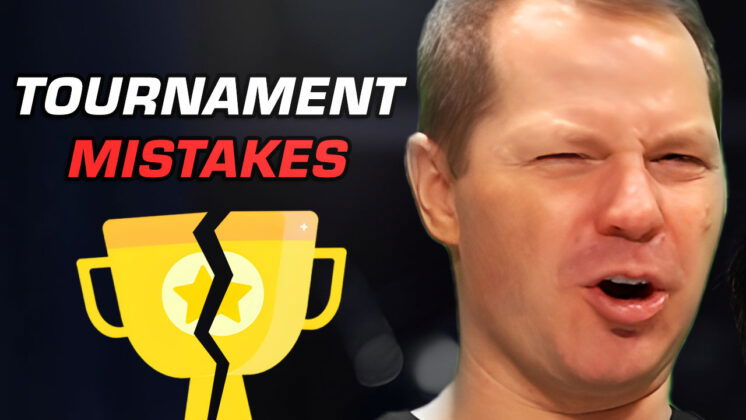Mistakes in poker tournaments can often lead to missed opportunities and early exits for players eager to make a mark at the table. As the tension rises and the stakes get higher, understanding the common pitfalls becomes crucial for success. From chip management in poker to knowing when to fold, these errors are frequently made, especially by novice players. Overvaluing poker hands and failing to adjust to blind levels can significantly diminish a player’s chances of victory. In this article, we will delve into the most critical poker tournament mistakes that can derail your game and offer insights on how to avoid them.
When diving into the world of competitive poker, players often grapple with missteps that can affect their performance. In tournament play, strategic miscalculations, such as poor chip management, can result in hasty decisions that may cost a player their tournament life. Additionally, many novices struggle with understanding the importance of adapting their strategies as blind levels rise or the danger of playing too many hands. Throughout this discussion, we will explore vital strategies aimed at mitigating these common errors and enhancing your overall gameplay.
Recognizing Common Poker Tournament Mistakes
In the arena of poker tournaments, awareness of mistakes can mean the difference between a quick exit and placing in the money. One prevalent error among amateur players is misjudging the strength of their hands, a blunder that often leads to significant chip loss. For instance, players might overestimate hands that appear strong on the surface without contemplating the tendencies of their opponents or the texture of the board. Therefore, learning to accurately read poker hands by reassessing their actual strength against what is on the table is critical.
Moreover, beginners often make the mistake of overvaluing certain hands based on past experience rather than current game dynamics. This could result in a commitment of chips that isn’t justified by the situation. To mitigate these common tournament poker mistakes, players must sharpen their analytical skills, considering factors like position, stack sizes, and the betting patterns of their opponents before making any decisions. Emphasizing real-time evaluation can help transform the way players engage with their hands and improve their tournament survivability.
Mastering Chip Management in Poker
Effective chip management is a cornerstone of success in any poker tournament. Players who fail to develop a sound strategy often find themselves clinging to their chip stacks, leading to desperation plays that compromise their position. A common downfall is playing too many hands and investing chips in an uncalculated manner. By adjusting their strategy concerning table dynamics, and understanding when to be aggressive or conservative, players can significantly improve their chip management skills.
Furthermore, as blind levels increase, the requirement for a solid chip management strategy becomes even more critical. Players must assess their chip counts and adjust their play accordingly, determining when to engage in stealing blinds or folding hands that may seem worthwhile earlier in the tournament. By balancing aggression with selective hand choice and effective bankroll management, poker players can navigate through the various stages of a tournament, avoiding costly blunders and positioning themselves for a more profitable outcome.
Frequently Asked Questions
What are the common poker tournament mistakes to avoid?
Common poker tournament mistakes include misreading poker hands, playing too many hands, overvaluing specific hands, poor bankroll management, and failing to properly adjust to blind levels. By recognizing these pitfalls, players can enhance their strategies and improve chip management in poker tournaments.
How does overvaluing poker hands affect my performance in a tournament?
Overvaluing poker hands can lead to significant losses, especially in tournaments where chip management is crucial. Many players mistakenly cling to strong hands at early stages, unaware of their actual position. Learning to fold even seemingly strong hands when necessary minimizes risks and helps maintain a healthy chip stack.
| Mistake | Description | Key Point |
|---|---|---|
| Misreading Poker Hands | Failing to assess the strength of one’s hand properly during crucial moments. | Adjust strategy based on board dynamics and opponent behavior. |
| Playing Too Many Hands | Getting involved in too many pots, leading to poor decisions. | Be selective and conserve your stack by entering fewer hands. |
| Overvaluing Hands | Holding on to weak strong hands without recognizing the game situation. | Recognize when to fold even seemingly strong hands to minimize risks. |
| Poor Bankroll Management | Committing too many chips to a single pot can lead to quick knockouts. | Employ a solid strategy to protect your bankroll. |
| Failing to Adjust to Blind Levels | Not adapting strategy as blinds increase, risking tournament position. | Widen hand range and increase aggression as blinds get higher. |
Summary
Mistakes in poker tournaments can devastate a player’s chances of success. The reality is that many players underestimate the importance of solid strategies and decision-making processes during competitive play. Players need to recognize the inherent complexities of tournament dynamics, from hand valuation and chip management to adjusting play as the game progresses. By understanding these common pitfalls, such as misreading hands or failing to manage bankroll effectively, players can cultivate a more disciplined approach to the game. Each mistake offers a lesson, giving players the opportunity to learn and grow, which is essential in the ever-evolving environment of poker tournaments. With practice, mindfulness, and adaptability, players can navigate these challenges and significantly enhance their performance at the tables.
